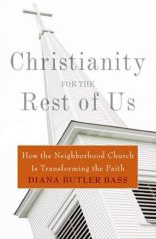
There is a nasty rumor going around, and Diana Butler Bass decided it was time to debunk it. Think “MythBusters Meets the Mainline.” The rumor is that only the large, conservative evangelical churches are growing, and that liberal, Mainline churches are dying. Now, is the myth completely false? Perhaps not. The Presbyterian Church (USA) has been losing members and we’re not doing a good job of reaching younger generations. But is the church dying? Are all liberal, Mainline churches becoming irrelevant?
Not so, says Diana Butler Bass.
Christianity For the Rest of Us stems from Bass’ research project, the Project on Congregations of Intentional Practice. The research pool consisted of 50 congregations from six denominations: United Church of Christ (UCC), Evangelical Lutheran Church of America (ELCA), Episcopal Church (ECUSA), United Methodist Church (UMC), Presbyterian Church (USA) and Disciples of Christ (DOC).
Bass begins the book by asking the question of what happened to the influential, neighborhood church? The church where everyone went because…well, because you just go to church. That’s just something you do. Bass works through the social and religious forces that have caused that church to not exist anymore, but talks about the new churches that have replaced the old churches, and how they are growing. These churches are politically and theologically progressive/liberal, and they are growing. They are actively reaching out into the community, engaged in a variety of forms of evangelism and calling people to a deeper spiritual life and commitment. Not exactly what you think of when you hear the term “liberal, Mainline church”? Then Bass’ book is one you need to read.
Since the book stems from her research, it is filled with vignettes from the ten, core churches of the study. Bass uses ten Christian practices as the ways in which she sees these progressive churches seeking to follow Christ in the world. The ten practices are hospitality, discernment, healing, contemplation, testimony (what? testimony in liberal, Mainline churches? Yup.), diversity, justice, worship, reflection & beauty. Finally she looks at how these particular practices are transforming lives, congregations and the world.
Many of these congregations are ones where a hierarchy of leadership is generally accepted. However, in some of the congregations Bass researched, she noticed a new trend among these Mainline churches:
“I observed congregations that had moved away from being hierarchical, top-down communities of authority toward more participatory forms of church, thus flattening their congregations. Instead of reasserting the ministerial or doctrinal voice of authority, they had opened their congregations to more voices, bringing a multiplicity of perspectives to bear on community life…The congregations along my way navigated between the extremes of spiritual individualism and authoritarian religion by emphasizing the power of relationship in community. Flat church.” ((Diana Butler Bass, “Christianity For the Rest of Us: How the Neighborhood Church Is Transforming the Faith” (San Francisco: HarperSanFrancisco, 2006), 234.))
Diana Butler Bass has been running with the Emergent-crew recently, and many are asking her about the Emerging Mainline, and what the relationship might look like. In the below passage, she lays out a view of tradition I think is helpful:
“In an age of forgetfulness, I met communities of memory – not of stilted traditions, but living ones that connect people to the past. People were not seeking tradition because they desired answers, authority, social order, or doctrinal purity. They simply wanted to remember. By remembering, spiritual nomads locate themselves in a story, find new-old traditions, discover a heritage that makes sense of their experience, and recreate family. Remembering meant just that – pulling together the fragments of fractured existence and putting them back together again.” ((Ibid., 237))
Finally – Bass shares with us a vision of what a “Christianity for the rest of us” might be about:
“Transformation is the promise at the heart of the Christian life…Christianity for the rest of us is not about personal salvation, not about getting everybody else saved, or about the politics of exclusion and moral purity. Christianity for the rest of us is the promise of transformation – that, by God’s mercy, we can be different, our congregations can be different, and our world can be different.” ((Ibid., 281))
Christianity For the Rest of Us is 284 pages of hope for the future of the church, especially the more progressive, Mainline churches. Do things need to change? Of course. Do Mainline churches need to rethink hierarchy, blind acceptance of all tradition and be open to the movements of the Spirit? Of course. But Diana Butler Bass gives us hope for the church in her book – now if one of these churches would just have an opening when I need a job.